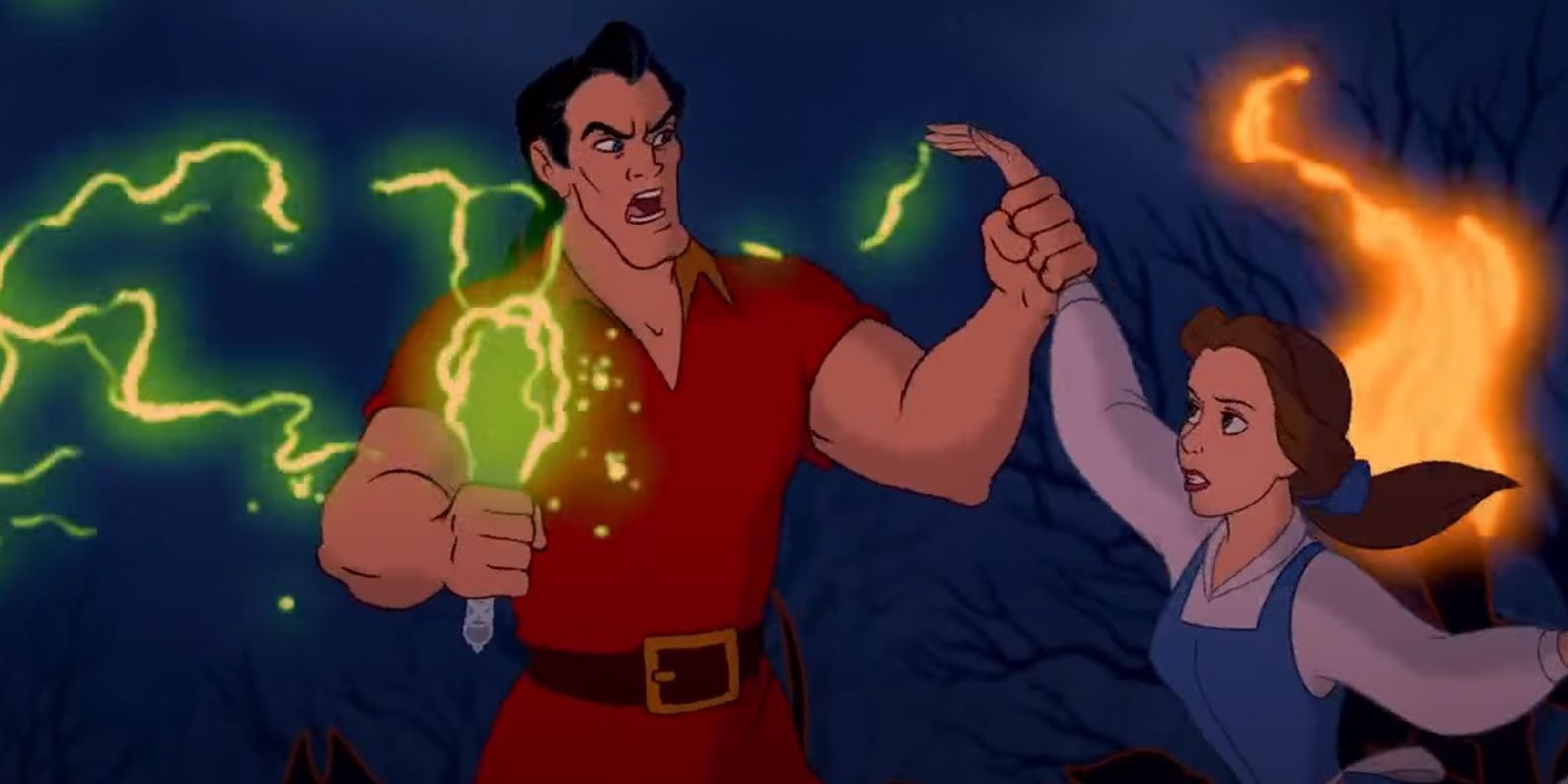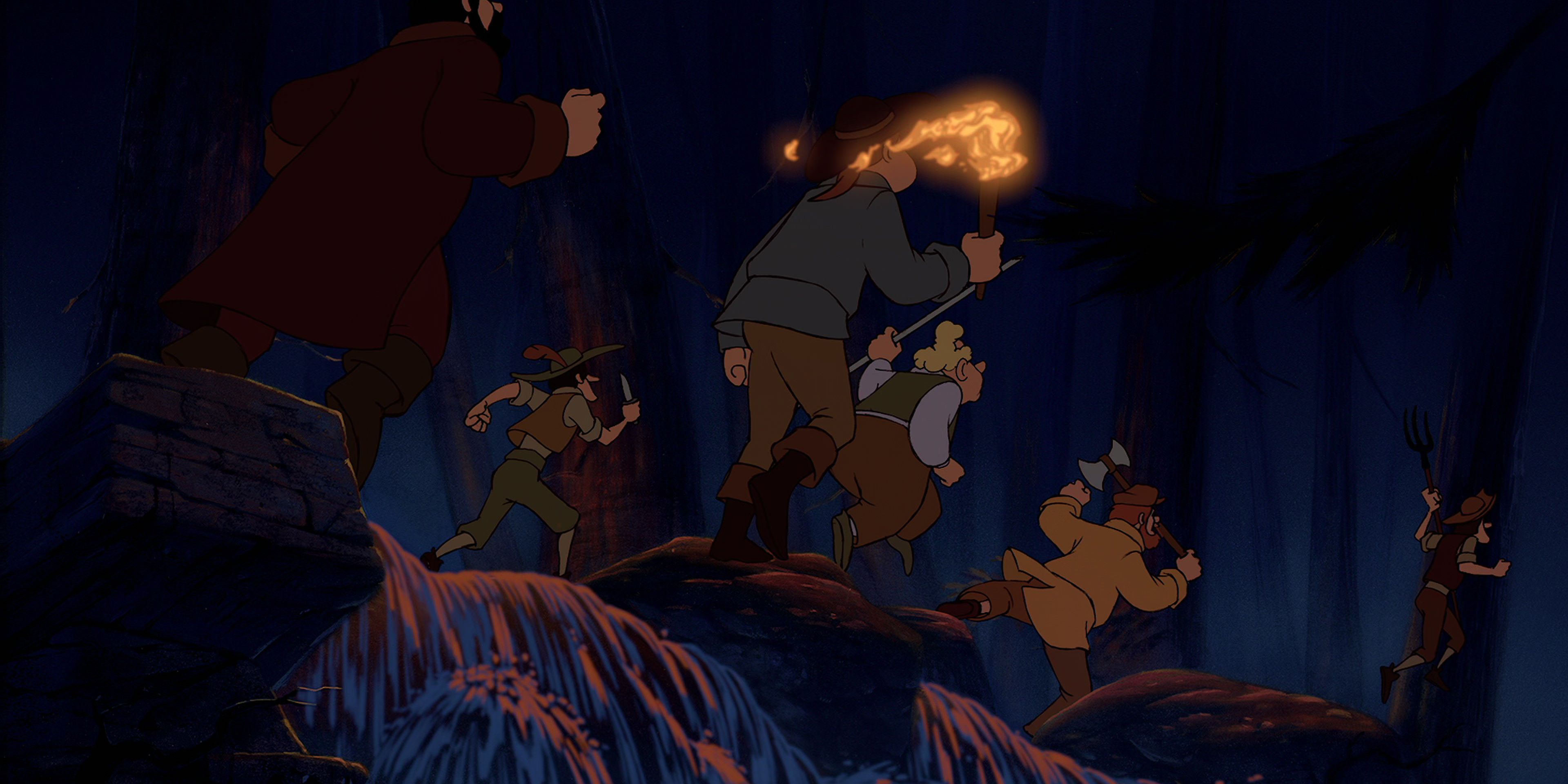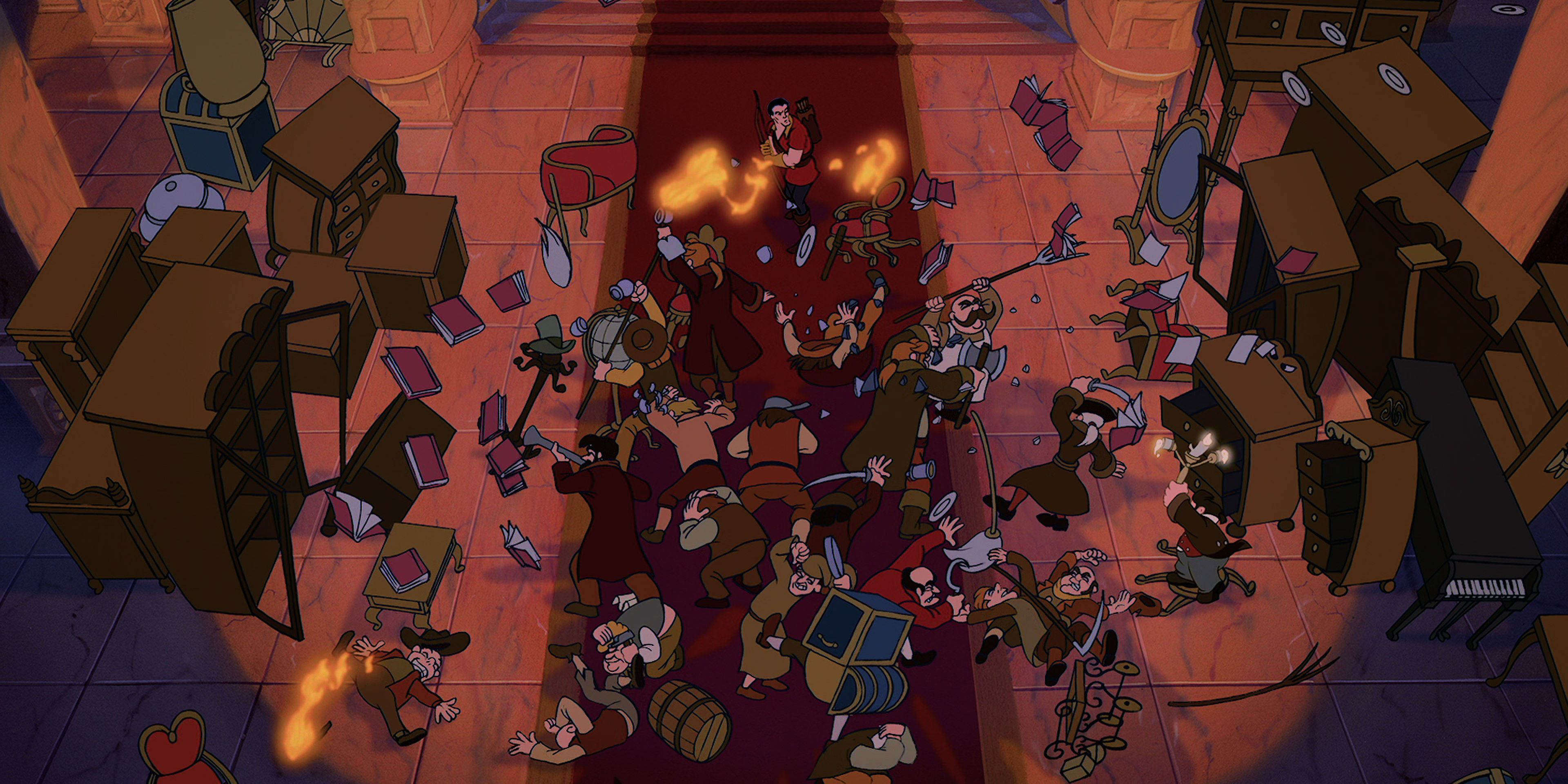It has been over 30 years since Disney’s Beauty and the Beast, and it is still one of Disney’s best animated movies. The strong characters, fairy tale aspect, and stunning animation make the film just as magical as when it premiered. It is still Disney’s only animated film (excluding Pixar) to receive an Academy Award nomination for Best Picture. Gaston is an excellent realistic villain, while Belle is one of the most iconic Disney Princesses. However, rewatching Beauty and the Beast brings up several harsh realities that went unnoticed while viewing the film for the first time.
Many Disney films have bleak truths upon rewatching them. However, Beauty and the Beast is a special case because it is seen as one of Disney’s more problematic films because of Belle and Adam’s relationship, among other things. Regardless, Beauty and the Beast is no exception to its harsh realities. Whether it is an explosive fact, poorly aged moments, a dark interpretation, or problematic aspects, Beauty and the Beast has its fair share of harsh realities that come to light upon rewatching the classic Disney film.
10 The Beast Only Came Back To Life Because Of The Enchantress
Gaston Killed The Beast, But The Enchantress Revived Him
When Belle and Adam reunite at the end of Beauty and the Beast, everything seems perfect until Gaston stabs Adam. The Beast teeters at the edge of death before Belle confesses her love, effectively breaking the enchantress’ spell. However, the time between Belle’s proclamation of love and Adam becoming human is so short that the fact that he died is often overlooked. Gaston’s stab was fatal—Adam really did die in his Beast form. Luckily, Belle broke the curse on time, so the enchantress used her magic to bring Adam back to life and turn him into a human once more.
9 Gaston Planned To Throw Maurice In An Asylum To Force Belle To Marry Him
Gaston Went To Extreme Lengths To Marry Belle
Gaston is a lot more sinister than he appears to be. His self-centered, narcissistic personality masks the darker parts of his character. One of the worst parts about Gaston is the lengths he would go to marry Belle, stopping at nothing to ensure she becomes his wife. Gaston conceives a plan to put Belle’s father, Maurice, in a mental health institution (known as the asylum in the movie) so that he can offer Belle Maurice’s freedom if she marries Gaston. It is a devious plan that portrays Gaston exploiting Belle’s vulnerabilities to make her his property.
8 The Mob Song Critiques How Extremists See The World
An Incriminating Lyric Exposes Extremists
During “The Mob Song,” the last musical number in Disney’s soundtrack for the animated filmBeauty and the Beast, the villagers sing about killing the Beast on the way to his castle. One particular lyric illustrates the song’s hidden meaning: “We don’t like / What we don’t understand / In fact it scares us.” This lyric portrays the true purpose of “The Mob Song”: to portray how extremists view the world. It puts the entire song into perspective—although the mob sings about killing the Beast, their only motivation is the fear that Gaston instilled in them.
|
Beauty And The Beast Songs |
The Characters That Sing |
|---|---|
|
Belle |
Belle, Gaston, Villagers |
|
Belle (Reprise) |
Belle |
|
Gaston |
Gaston, LeFou, Their Friends |
|
Gaston (Reprise) |
Gaston, LeFou, Their Friends |
|
Be Our Guest |
Lumiere, Mrs. Potts, The Dishes |
|
Something There |
Belle, Adam |
|
Beauty And The Beast |
Mrs. Potts |
|
The Mob Song |
Gaston, The Villagers |
The villagers cannot think for themselves; they follow societal expectations, which involve excluding anyone different. It is why they are wary of Belle, the peculiar bookworm, and Maurice, the crazy inventor, and it is why they want to kill the Beast. Extremists are born from societal norms—they take an average perspective and maximize it to the most brutal interpretation possible. “The Mob Song” also exposes the dangers of societal norms and how they can quickly lead to spiraling situations. What initially began as a staged intervention turned into a plan to murder a living being for no reason.
7 Belle Was The Only Woman In Her Village Who Knew How To Read
Reading Was Discouraged For Women
The musical number “Belle” in Beauty and the Beast portrays Belle as an anomaly, not the norm. The villagers view her as such because of her love for reading; they frown upon her passion for books. Gaston even comments, “I t is not right for a woman to read” because they start forming their own thoughts and opinions. These instances suggest that Belle is the only woman in her village who knows how to read, and aside from the bookseller, societal norms widely discourage women from reading. Belle does not only know how to read, but it is her favorite pastime.
6 Gaston Is One Of Disney’s Scariest Villains Because Of His Realism
Gaston Mimics Real Life Predators
Disney actually breaks a 54-year-old villain trend with Beauty and the Beast: Gaston is the first male villain in a Disney Princess film. Some might not see Gaston as scary because of his dim-witted personality, but he is one of Disney’s scariest villains. Gaston is frightening because of his realism. He embodies toxic masculinity, and his relentless pursuit of Belle makes him a predator. Gaston does not give up, no matter how many times Belle rejects him. He does not see her as an independent person; he only sees Belle as someone who can give him beautiful progeny.
Gaston is a dangerous reflection of men who cannot accept rejection from women.
Gaston is a dangerous reflection of men who cannot accept rejection from women. The live-action adaptation of Beauty and the Beast makes Gaston explicitly worse. In the animated film, once Gaston learns of the Beast’s existence, he pushes his marriage to Belle to the back of his mind as he prioritizes killing the Beast. The live-action version of Gaston does not forget Belle—he taunts her, saying the Beast’s head will hang in their house, and Belle cannot avoid marrying him. The 2017 film chose to capitalize on Gaston’s realism from the animated movie, which paid off immensely.
5 Be Our Guest Glamorizes Labor Exploitation
Be Our Guest Suggests That The Working Class’ Purpose Is To Serve The Rich
“Be Our Guest” is often regarded as one of the best musical numbers in Beauty and the Beast. From the dazzling theatrics to the rich animation, there are many reasons why “Be Our Guest” is popular. However, one of the verses has a dark meaning that is often missed. Lumiere sings, “Life is so unnerving for a servant who’s not serving / “He’s not whole without a soul to wait upon,” which suggests that the working class exists to serve the upper class. When the enchantress cursed the castle, the servants became animate objects, making them feel useless.
They spent their lives catering to Adam, serving him selflessly without thinking about their own desires in life. Everyone deserves a chance to seek their purpose, and someone being a servant does not mean they cannot have a life outside their job. This verse in “Be Our Guest” certainly makes things interesting because it is unknown whether the song was written that way purposely or if it is just poorly aged lyrics—a real possibility because of the more progressive world views today.
4 Belle Has An Attraction To Animals
Belle Falling In Love With The Beast Suggests She Is Attracted To Him In That Form
Belle falls in love with Adam and confesses her love on his deathbed. She kisses him once he is human again. However, Belle hesitates upon the Beast’s transformation—she falls in love with an animalistic creature, not a human being. Although Belle is overjoyed once she realizes Adam as a human is still the man she fell in love with, there is a hint of disappointment on her face. This fact means Belle falls in love with Adam in his Beast form. She knew what she was getting into, and it did not change her love for him.
It is a little disturbing to realize Belle’s romantic interest in animals, especially since beastiality is never a theme in a Disney film.
Belle has a genuine attraction to animals. It is a little disturbing to realize Belle’s romantic interest in animals, especially since bestiality is never a theme in a Disney film. It is most likely not intentional on Disney’s part, but it does not change the fact that the narrative portrays Belle as attracted to the Beast. The live-action adaptation takes it a step further at the end of the film when Belle asks Adam how he would feel about growing a beard, making Belle’s affinity for bestiality far more likely.
3 Chip Was Born During The Curse As A Cup
Chip Was Never A Human Before The End Of Beauty And The Beast
One of Mrs. Potts’ children, Chip, is a broken teacup who is very young. Chip’s age is unknown until he transforms into a human at the end of Beauty and the Beast. Based on Chip’s interactions with Mrs. Potts and his human form, he cannot be older than seven or eight. “Be Our Guest” states that the castle has been enchanted for 10 years, and Adam was 11 years old before the curse. That means Chip was born during the decade. When the curse breaks, he becomes a human for the first time.
However, it is not clear how Mrs. Potts reproduced children as a teapot, especially since there does not seem to be a father in the picture. Beauty and the Beast never clarifies how enchanted teapots—or any enchanted object, for that matter—can reproduce children. It is possible that enchanted objects have similar abilities to humans, regardless of the mechanics. However, chances are Chip’s age is just something Disney overlooked, similar to how Disney overlooked the possibility of The Lion King‘s Simba and Nala being related because of how lion prides work.
2 The Dishware That Breaks Were Real People
The Dishes Do Not Get To Return To Their Former Selves
When Gaston enters the castle with his men, the enchanted objects ambush them. It is an exciting, well-deserved moment since the villagers had no business intruding. However, upon rewatching the scene, the fighting is noteworthy because enchanted dishes and other pieces of furniture break when attacking Gaston’s men. If the objects break themselves in that state, it most likely means they die. The dishes, in particular, shatter into many pieces, making them impossible to repair. The servants gave their lives to protect their home, but it comes at the ultimate cost—they will never return to their human forms.
1 Belle & Beast Is A Classic Example Of Stockholm Syndrome
Belle Fell In Love With Her Captor
One of the most common critiques of Beauty and the Beast is Belle and Adam’s romance. They meet because Belle attempts to rescue her father, but Adam catches her. He offers Maurice’s freedom in exchange for Belle’s, which she accepts, creating a power imbalance. Therefore, when Belle falls in love, she becomes a victim of Stockholm Syndrome. Although Adam lets Belle go because he truly loves her, Belle still feels obligated to return. Furthermore, it only took a few nice gestures for Belle to fall in love. It is not one of Disney’s best romances, despite the film’s overall excellence.



